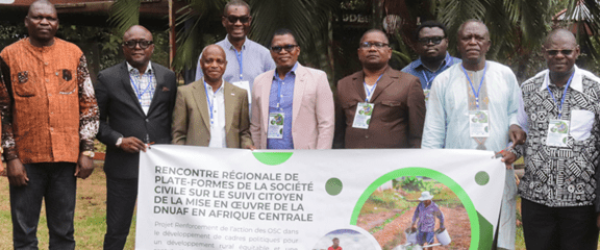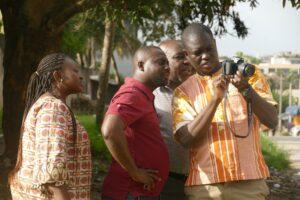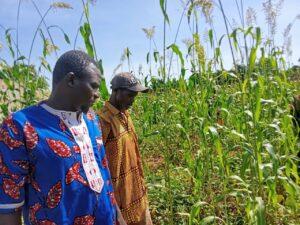From September 23 to 25, 2025, the city of Kinshasa hosted the regional meeting of civil society platforms on citizen monitoring of the implementation of the United Nations Decade for Family Farming (UNDAF).
Organized by INADES-Formation, with the support of INADES-Formation RD Congo, this activity was part of the ACRE project (Strengthening CSO action in the development of policy frameworks for equitable rural development and increased contribution of family farmers to the achievement of the SDGs), funded by the European Union and jointly implemented by INADES-Formation and the World Rural Forum (WRF).
This meeting was held in a context where the implementation of the UNDAF, launched in 2019 by the United Nations, requires greater involvement of civil society organizations (CSOs) to ensure effective and inclusive citizen monitoring of the commitments made by States.
The workshop brought together 21 participants from Congo, Cameroon, Chad and Côte d’Ivoire, including representatives of National Family Farming Committees (CNAF) and technical partners such as FAO and IFAD. The main objective was to strengthen the collaboration and capacities of regional players to ensure coordinated follow-up to the UNDAF, while consolidating participatory governance in agricultural development.
In his opening remarks, Mr. Norbert KINVULA, Director of INADES-Formation RD Congo, stressed the importance of this meeting as a forum for constructive dialogue between stakeholders committed to family farming. For his part, Mr Sena ADESSOU, Secretary General of INADES-Formation, emphasized that “family farmers represent 90% of the world’s farms, and are the guarantors of food security and climate resilience”.
For three days, participants alternated between presentations, round tables and group work on the seven pillars of the UNDAF’s Global Plan of Action (GPA). Discussions focused on key themes such as :
- Identification of priority indicators for UNDAF monitoring at national and regional levels;
- The design of tools and approaches adapted to data collection and analysis;
- Identifying sustainable sources of financing;
- Setting up validation bodies to guarantee data reliability;
- And the definition of mobilization strategies to sustainably involve stakeholders.
Sharing experiences from Cameroon, Chad, Côte d’Ivoire and the DRC highlighted concrete citizen monitoring initiatives: local budget monitoring, CSO participation in land governance and the inclusion of rural women in agricultural policies.
The working groups formulated key recommendations for a harmonized UNDAF citizen monitoring framework in Central Africa. These include
- The creation of national multi-stakeholder committees involving governments, CSOs and technical partners;
- The adoption of digital tools to improve transparency and data feedback;
- Setting up a regional consultation framework coordinated by PROPAC;
- And the development of sustainable funding mechanisms to support monitoring and advocacy efforts.
These recommendations aim to institutionalize citizen monitoring as a central pillar of agricultural governance, ensuring that local realities and the needs of family farmers are better taken into account.
The closing ceremony was marked by words of satisfaction and recognition. The participants praised the quality of the organization and the relevance of the exchanges, which helped strengthen the common vision of CSOs for inclusive agricultural development.
In closing the proceedings, Mr. Sena ADESSOU called for this regional synergy to be maintained and for the dynamic of collaboration between players to be pursued: “Citizen monitoring is not an end in itself, but a tool for building fair and equitable agricultural policies together, centered on rural families”.
This workshop in Kinshasa marks a key stage in the UNDAF regional citizen monitoring caravan, after West Africa and before the closing event in Kigali. INADES-Formation and its partners are committed to giving family farmers their rightful place in the governance of rural development in Africa.

INADES-Formation – General Secretariat











